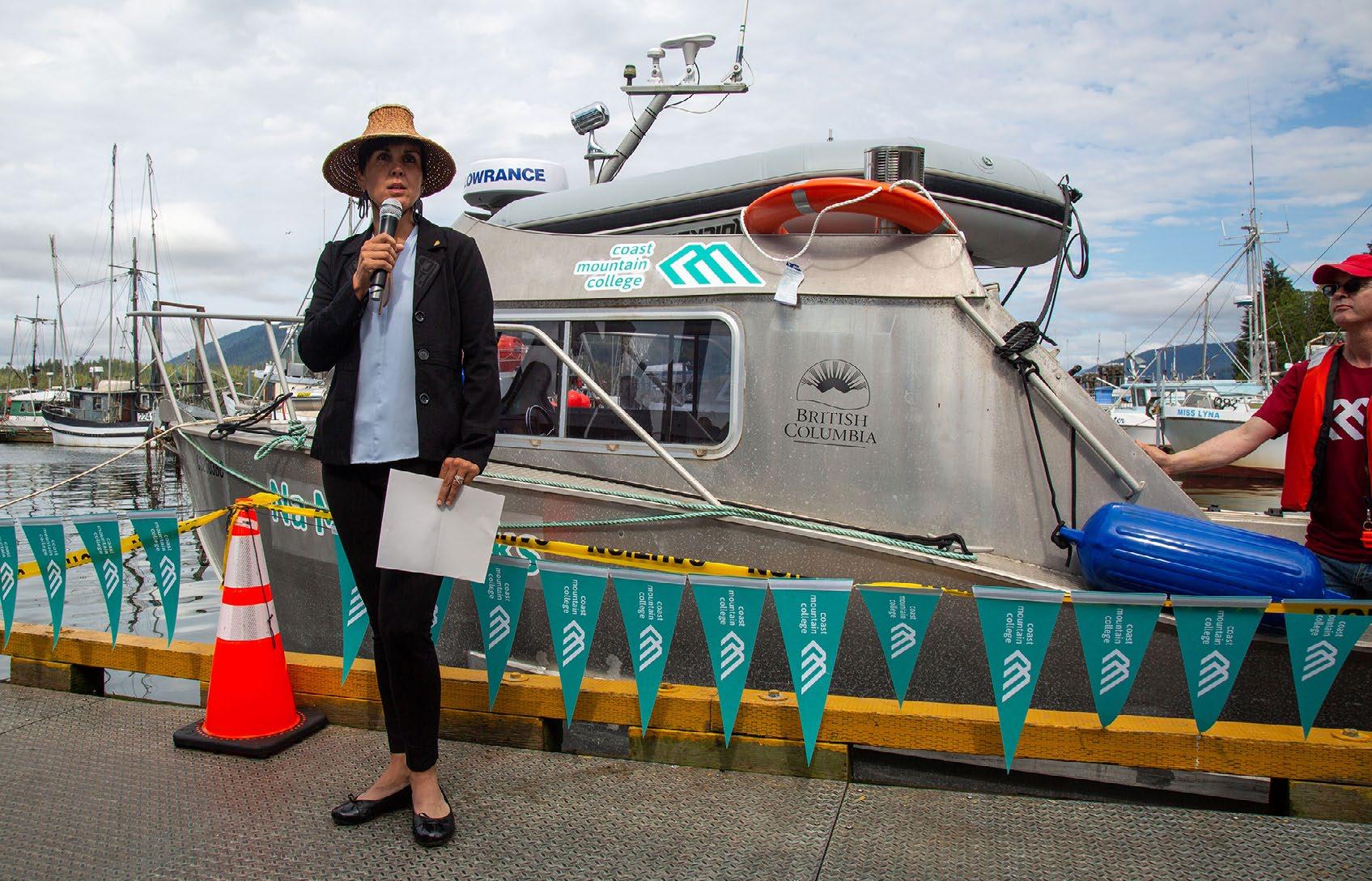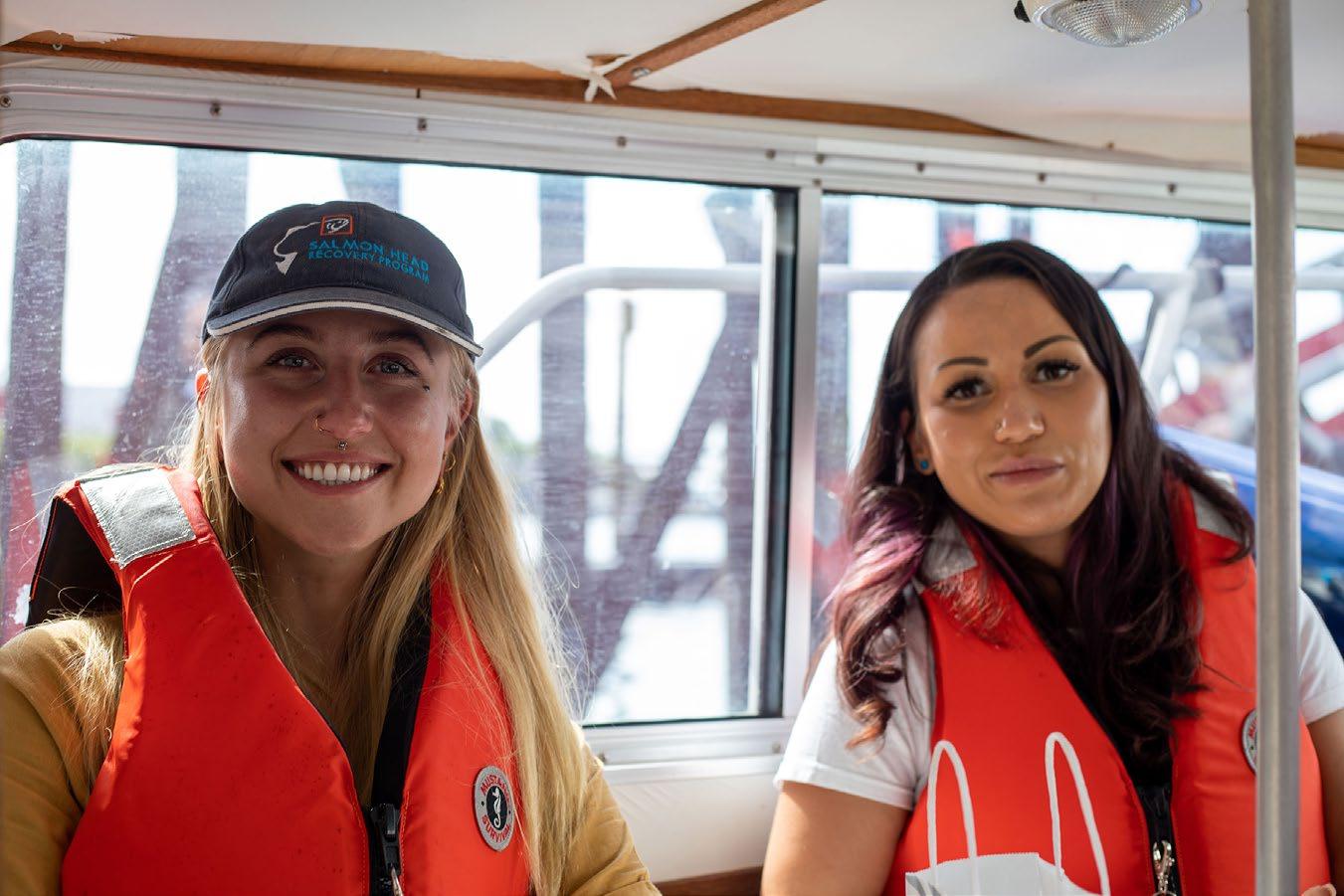
7 minute read
Na Malsga Aks—The Story the Water Tells
By Kunkel, T., Shaw, K., Lyons, L., Quinlan, D., Bastin, H., Oskey, S. Coast Mountain College
NORTHWEST BRITISH COLUMBIA (BC), with its rugged geography, proximity to the Pacific Ocean and variable climate, is in many ways the ideal setting for a college that offers place-based instruction to budding biologists.
Experiential Place-Based Learning
The strategic goal of Coast Mountain College (CMTN) is to become the college of choice for Experiential Place-Based Learning (EPBL). Taking advantage of the Pacific Northwest, its ecosystems and unique Indigenous cultures, the College is well on its way to achieving this goal by its target date of 2027. Experiential Place-Based Learning (EPBL) is about the land and complements CMTN’s goal of creating adventurous pathways to transform lives through learning.
Coast Mountain College has worked hard to find creative ways to move its courses from the classroom into the field. The College offers a number of terrestrial field schools— Adventures in Northwest Watersheds, Icefields to Oceans, Coast Mountain Ecology, among others. Terrestrial field schools are relatively easy to implement; marine-based field schools… not so much. CMTN faculty and administrators had a vision for a mobile marine classroom—a classroom on water with up-to-date technology—but for a long time the vision seemed to be out of reach.
Until recently, CMTN used the Sea Lemon, a 19ʹ boat leased from the Department of Fisheries and Oceans that comfortably held four people. The drawback to the Sea Lemon was that, for a course with more than four students, much precious field time was spent ferrying cohorts back and forth to the site. Besides this limitation, the boat was not intended for use as a classroom and lacked the technology to fully support the needs of the Applied Coastal Ecology (ACE) Program.
Then, in 2019, Coast Mountain College received a $250k grant from the BC Ministry of Advanced Education and Skills Training and a $12k grant from Co-operative Education and Work-Integrated Learning Canada (CEWIL Canada). The grants enabled the College to purchase a 27ʹ boat plus additional outdoor classroom and camping equipment for the ACE program.
The long-awaited mobile marine classroom was becoming a reality! The new boat could be outfitted with a crane and winch to lower sampling equipment for benthic cores, grab samples, traps and plankton tows. A remote underwater vehicle (ROV) could be purchased, as well as a side scan sonar and a singlebeam echo sounder. Faculty and staff at CMTN were excited— this outdoor classroom would allow students to put theory into practice in marine environments using state-of-the-art equipment.
The Applied Coastal Ecology (ACE) Program
For more than 20 years, the ACE Program has prepared students for careers in coastal natural resources management, ecosystem restoration, environmental monitoring and related fields. The program balances foundational learning (e.g., biology, geography, chemistry and oceanography) with specialized courses in areas such as salmon, ground fish and shellfish
management; stream habitat restoration; rainforest ecology; and wildlife management.
Students in the ACE program receive important technology training in computer database management, GIS mapping, surveying, technical writing and presentation. They participate in real-world, community-based projects where they gain employment-ready experience and, ultimately, a strong sense of how coastal ecosystems react to anthropogenic stressors, ways of mitigating these impacts and methods of reclaiming and restoring ecosystems.
With a new mobile marine classroom, students would be able to practise coastal natural resources management, ecosystem restoration and environmental monitoring with the tools and technology they will use when entering the workforce.
Building capacity
The Pacific Northwest is currently poised for economic growth estimated at approximately $18.7 billion, and the demand for graduates to support this development is strong. Building capacity in the skills required to conduct environmental assessments and to participate in other aspects of the proposed developments, particularly for local First Nations, is an integral part of the ACE program. Many ACE graduates currently work in management positions with local First Nations (including Metlaktla, Northcoast Skeena, Gitxaala, Nisga’a, Tsleil-Waututh and Lax Kalaams), provincial and federal governments, environmental consultants, port authorities and other supporting industries. Proud as it was of this track record, CMTN was anxious to expand its reach with its new and more effective mobile marine classroom.
The process
Securing the funding was only the starting point. The College struck a Boat Purchase Committee to determine the type of vessel needed, its usage and the costs associated with operating it. The committee put together a business case, which CMTN President’s Council approved; but then Covid-19 interrupted the process until 2021, when a subcommittee convened to continue the work of securing a 27ʹ boat and the outdoor classroom equipment (e.g., Blue ROV2, drones, underwater cameras, gravity corers, hydrophone, binoculars, safety equipment) that was required.
After much research, the subcommittee settled on a boat, the Honey Bee, and hired a marine survey company to perform a stability test and assess the overall condition of the vessel. The boat was pronounced capable of carrying 12 passengers (two instructors and ten students) and the repairs and modifications
Chair of the Coast Mountain College Board of Governors, X’staam Hana’ax (Nicole Halbauer). Photo provided by Coast Mountain College.
recommended during the survey were completed. Meanwhile, excitement was building. The long awaited mobile marine classroom was nearly ready to launch!
Indigenization
Since 1995, local Indigenous communities within the College region have supported and guided the College’s ability to provide and grow Indigenous culture and knowledge into the student experience. CMTN is committed to incorporating the Calls to Action and Indigenization set forth by Canada’s Truth and Reconciliation Commission with increasing depth and breadth, and to transforming the College’s teaching and learning to be responsive to Indigenous learners and communities.

The Prince Rupert campus sits on the unceded territory of the Coast Tsimshian people and CMTN’s field schools are held on their lands. With the acquisition of the Honey Bee came a new opportunity for Indigenization. CMTN’s First Nations Access Coordinator, Sharon Oskey, worked with Elders in Prince Rupert to find a new Indigenous name for the boat. After much discussion and consultation, the Elders suggested Na Malsga Aks, which, in the Ts’msyen language, translates as “the story the water tells.”
The CMTN subcommittee loved the name, as did many others, so a naming ceremony was planned for August 22, 2022 at the Prince Rupert waterfront. A crowd of more than 25 people looked on as Elder Murray Smith and Elder and Language Holder Velma Nelson, dressed in their regalia, used cedar branches to cleanse the boat and called out the name three times in a traditional Indigenous naming ceremony.
North Coast Member of the Legislative Assembly (MLA) Jennifer Rice, Parliamentary Secretary for Emergency Preparedness, represented Anne Kang, Minister of Advanced Education and Skills Training, at the dedication. Ms. Rice told the crowd that it was the Coastal Ecology Program that, more than 20 years ago, offered her adventure and a trek to a new life in Prince Rupert. “The new equipment will continue to teach the future stewards of the North Coast region,” she said. Following the dedication, Ms. Rice and nine other guests enjoyed a tour of the harbour in the new boat.
CMTN Environmental Science alumna Jackie Goetz and local media personality Kelly Kenny joined the group on board for a short harbor tour after the boat naming ceremony. Photo provided by Coast Mountain College.
Going Forward
Na Malsga Aks and its state-of-the-art equipment will ensure that students of the ACE Program are well prepared for the workforce and equipped to help protect the sensitive environments of the Northwest Coast region for years to come.
As MLA Rice said in her address at the naming ceremony, “Here on the North Coast, we’re fortunate to be surrounded by the complex ecosystems that make our region so unique…. The mobile marine classroom is a significant tool for carrying out the necessary work in protecting and monitoring this important coastal environment and training the future stewards of our Northwest region.”
In the weeks following the dedication ceremony, College students have been active in the Aquatic Invasive Species Program, a partnership of CMTN, Fisheries and Oceans Canada and the Port of Prince Rupert. In early September, the students launched and examined settlement plates, which yielded invasive tunicate species, and trapped a number of invasive European green crabs (Carcinus maenas).
Program co-founder and current Coordinator Ken Shaw says, “We have reached the stage where we can confidently say that we offer the only diploma-level program in Coastal Ecology in North America with a range of practical experiences from the near shore, intertidal and oceanographic environments.” And all this is thanks to the new mobile marine classroom, Na Malsga Aks.








